Sing, Baby, Sing
Cast & Crew
Sidney Lanfield
Alice Faye
Adolphe Menjou
Gregory Ratoff
Ted Healy
Patsy Kelly
Film Details
Technical Specs

Synopsis
After Joan Warren is fired from her singing job at the Ritz Club, where she performs with the Ritz Brothers, she seeks help from theatrical agent, Nicky Alexander. Nicky, however, is in the process of being evicted from his office suite, so he tells her to find another agent. When she insists that he represent her, he takes her to Mr. Brewster, president of the Federal Broadcasting Company, and Joan auditions, but Brewster refuses to hire her because she is not of the upper class. Back at the club, Joan packs her bags, while in the street, a crowd gathers around drunken actor Bruce Farraday. Nicky leads Farraday into the club, where Farraday orders a huge feast and hears Joan perform her last song. After more wine, Farraday passes out, and they take him to a hospital, where he babbles lines of Shakespeare. To create some publicity, Nicky tells Joan to play "Juliet" to Farraday's "Romeo." While Al Craven, the brother of Nicky's secretary Fitz, searches for alcohol to keep Farraday from sobering up, Nicky calls the newspapers, saying that Farraday is on his deathbed. When the doctor arrives and forbids visitors, Al pretends to be Farraday's personal physician and relieves him of the case. Nicky sneaks Joan in to see Farraday, while cynical reporter Ted Black and Joe, a photographer, climb onto the fire escape and photograph them. Later, Al accompanies Farraday home, and the puzzled Farraday wonders why he can't remember hiring a personal physician. The newspapers print the story, and Brewster decides that he wants to hire Joan on the condition that Farraday will perform as well. At their new home at the Madison Towers, the group learns that Farraday is about to return to Hollywood at the behest of his cousin and business manager, Robert Wilson, who is furious over the publicity. Nicky goes to Farraday and suggests that he show his cousin that he has a head for business by getting the lucrative radio contract. Robert arrives, tells the newspapers that Joan is a gold digger and escorts Farraday onto the train leaving for California. As a result of the new story, Brewster no longer wants to sign Joan. Ted explains that to be the first to print a retraction of Robert's statement, his newspaper will fly Joan out to Farraday. They fly to Kansas City to meet Farraday's train and trick Robert into leaving without Farraday. Then, they arrange with Brewster to broadcast that evening from Kansas City. They round up some performers for the show, including the Ritz Brothers, who happen to be in town. As Farraday prepares to go on the air, Robert returns and locks himself in the hotel room with Farraday, but Farraday escapes. He arrives at the station in the nick of time and exonerates Joan, securing for her the radio contract with Brewster.

Director
Sidney Lanfield
Cast

Alice Faye
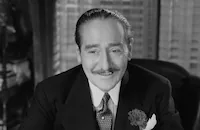
Adolphe Menjou

Gregory Ratoff

Ted Healy
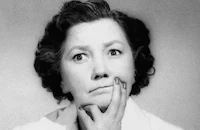
Patsy Kelly
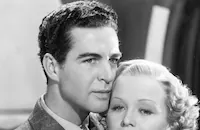
Michael Whalen
Ritz Brothers

Montagu Love
Dixie Dunbar

Douglas Fowley

Tony Martin
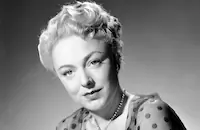
Virginia Field
Paul Stanton
Paul Mcvey
Carol Tevis
Cully Richards
Jerry Larkin
Don Rowan
George Chandler
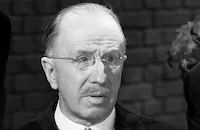
Arthur Hoyt
James Morton
Ernie Stanton
Sam Mcdaniel
Pat Flaherty
Inez Courtney
Julius Tannen
Charles Tannen
Ann Bupp
Crew
Louis Alter
Richard Billings
Harry Brand
Walter Bullock
B. G. Desylva
Fred Fox
Robert Fritch
Mark-lee Kirk
Thomas Little
Peverell Marley
Barbara Mclean
Sidney D. Mitchell
Lew Pollack
Gale Roe
Royer
Louis Silvers
Milton Sperling
Milton Sperling
Harry Tugend
Arthur Von Kirbach
Richard A. Whiting
Jack Yellen
Jack Yellen
Jack Yellen
Darryl F. Zanuck

Film Details
Technical Specs

Award Nominations
Best Song
Quotes
Trivia
Notes
The plot summary was based on a screen continuity in the UCS Cinema-Television Library. Many of the reviews of this film noted similarities to well-publicized events of the previous year involving John Barrymore and Elaine Barrie. According to modern sources, as the alcoholic Barrymore was recuperating in a New York hospital in February 1935, he received a note from nineteen-year-old Hunter College student Elaine Jacobs, who requested an interview with him. After he invited her to visit, she returned daily, and soon Barrymore, who was separated from his wife, Dolores Costello, moved in with Jacobs and her mother. Jacobs dropped out of college and, changing her name to Barrie, became Barrymore's protégée. As their romance grew, they also experienced periods of difficulty, culminating in Barrymore's escape by train for California in September 1935. After a reporter alerted Barrie to Barrymore's flight, she boarded a plane to Chicago and, when she missed him there, continued to Kansas City, all along the way making headlines, as did the pet names they called each other, "Caliban" and "Ariel." In Sing, Baby, Sing, the pet names become "Romeo" and "Juliet." While Barrie did not catch up to Barrymore on that trip, they married in November 1936, and they were subsequently divorced in 1940.
This film, unlike others made by Twentieth Century-Fox at the time, begins with the statement, "The events and characters depicted in this photoplay are entirely fictional and any similarity with actual persons, either living or dead, is not intentional but purely co-incidental." Despite this, Barrymore threatened to sue the studio, according to MM. Frank S. Nugent of New York Times remarked in his review, "Twentieth Century-Fox, with delightful impudence and its tongue in its cheek, solemnly disclaims any factual basis for its new musical comedy, Sing, Baby, Sing, one of the most amusing pictures shown at the Roxy this year." Variety commented that Menjou, in this film, "is obviously doing a caricature of John Barrymore, but it's all in such good fun no one could mind that." No information has been located concerning the results of Barrymore's threat to sue.
This was the Ritz Brothers' first feature. According to Los Angeles Boulevard Record, studio head Darryl Zanuck signed them after viewing their act in a Hollywood nightclub. Reviewers noted that the film contains bits from their nightclub act, including a Dr. Jekyll and Mr. Hyde parody, with the Frankenstein monster thrown in, an acrobatic-operatic aria, and, according to Variety, a "satire on Ted Lewis and the half-wit Harry Richman."
This was to be the first Twentieth Century-Fox film of Tyrone Power, who was signed to a long-term contract by the studio in May 1936 and cast for the role of "Ted Black." He was replaced after production began, however, by Michael Whalen. While a news item in May 1937 reported that he asked to be taken out of the film, modern sources state either that director Sidney Lanfield fired Power, whom he considered too weak for the role, or that Zanuck, after viewing rushes, felt that the film needed a "name" actor in the role. Modern sources also state that star Alice Faye originally urged Zanuck to cast Power in the role.
According to Hollywood Reporter news items, Fred Allen was originally cast for role of "Nicky Alexander." When he became ill in April 1936, the studio at first considered Adolph Menjou, who at that time had not yet been cast as "Bruce Farraday," and Ted Healy. After the studio settled on Healy, whom they borrowed from M-G-M, they closed a deal with Gregory Ratoff, who was in Paris at the time, for the role. The studio then tried to get Fred Allen or Jack Oakie for the role of "Al Craven," but because neither were available, Healy got the role. This was the first role of note for singer Tony Martin, who in 1937, married Alice Faye. According to a Hollywood Reporter news item, Patsy Kelly was borrowed from Hal Roach's company. Helen Wood is listed in Hollywood Reporter production charts as a cast member, but her participation in the final film is doubtful.

Miscellaneous Notes
Released in United States 1936
Released in United States 1936











